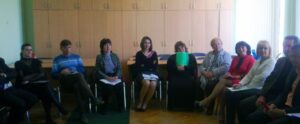
The first training of our project “Teaching formal and informal leaders of rural communities about gender integration in the mobilization of rural communities” with the financial support of USAID project AgroInvest was held in Trypillia village in Kyiv region. The training took place because of the persistence of the head of Trypillia silrada, who applied several times to conduct a training for the village heads who do not know how to act constructively in their communities when decentralization reform is being implemented. The training started with a very tense atmosphere. Representatives of the communities were very concerned about the situation caused by the reforms, lack of information, lack of “instructions from above” on what to do and how to join. However, training was held according to the the plan using interactive methods. Participants could share their vision for reform in small groups, identifying the advantages and disadvantages of decentralization.
The results of this work showed that most formal community leaders are frustrated about the lack of clear guidance in the form of well-defined steps. They are not ready to take responsibility for making decisions. There is also a complete lack of vision, strategic planning, lack of skills in teamwork, delegation of authority etc. Leaders have previous skills in attracting community members to joint cleanup or conducting community feasts, but most experience suggests that the activity is extremely low, and involving people in the activities is an extremely difficult task. In this regard, most formal community leaders refused to engage community members, saying that it is easier to do everything themselves. Meanwhile the resource of the informal leaders in the communities is overlooked or even seen as opposing and simply discarded.
As a result of the training, participants offered the plan on clearing the source of drinking water in the village of Trypillia and restoring a park for the residents of the village.
In May UWF held trainings in Poltava and Kharkiv. Poltava training participants were village heads, deputies of village councils, entrepreneurs, farmers and representatives of civil society. The general anxiety about the reform and decentralization was typical for this group as well. Asked what are the advantages of the reform, participants impulsively responded that there are none, but after it turned out that there are more benefits of decentralization than expected, a turning point in the mood of the participants of the training was reached.
The general conclusion of the group was the idea that the process of implementing the reform is heavily influenced by emotions. In addition, one of the village heads loudly announced the fact that Ukraine has a really good legal framework, with certain inconsistencies of course, however, there is enough legislation to develop communities and attract residents to building capacities. Then it turned out that this man studied in Poland and Germany as a part of international projects for community development. The majority of participants responded to this remark with disbelief and resentment. Still community leaders have yet to learn to take responsibility.
The training also had another notable trend. The vast majority of men acted with denial: ‘it cannot be done because the law does not provide the process, or people do not want it, or there is no business’. Most of the female participants were thinking more constructively and sought answers on what can be done.
For community development, participants offered providing the drinking water of high quality to the village and holding the general community meeting to spread information on the reform of decentralization. Everyone noted the usefulness of the training, emphasized that it gave them perspective of next steps. The handouts were also found very useful.
In Kherson, not only residents of rural areas of this region met, but also representatives of Zaporizhzhia.
The participants gained very real, positive exchange experience. Despite the fact that these two regions are adjacent to each other, they have a difference in decision-making. Kherson Center also increased the motivation of the participants, holding a 40-minute lecture and presentation on decentralization reform and community associations, demonstrating the need for ownership of community mobilization tools.
During further work participants vividly discussed specific issues concerning community involvement in activities. Finally, the group came to the conclusion that it has to be done, although it’s extremely difficult. And the general conclusion was that it is not the responsibility of the administration, but the “special people” who knowingly authorized themselves and clearly understand that the foundation of their activity is cooperation, democratic approach, respect for otherness, involving everyone and so on. Cooperation of local government and such people is mandatory. Participants developed plans for urgent improvements in commutates: the reconstruction of first aid stations; creating a center of culture and leisure; reconstruction of the recreation park by residents themselves.
One participant emphasized that “the training helped to open our eyes and see that our thoughts are going in one direction. Now our task is to weave these simple truths, that have very deep meaning, in our work. I am also hyped that there are so many like-minded collegues ”

